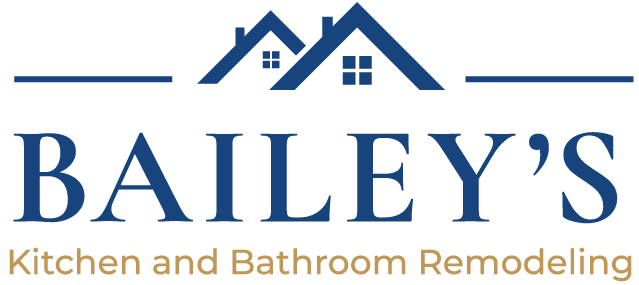Vinyl vs. Engineered Hardwood: Make the Right Choice
When it comes to picking out new flooring for your home, vinyl and engineered hardwood are two of the most popular choices. Each has its own unique benefits and drawbacks, making it essential to understand what they offer before making your decision.
Whether you’re focused on durability, style, or budget, knowing the strengths and weaknesses of vinyl and engineered hardwood will help you choose the flooring that best fits your needs and lifestyle.
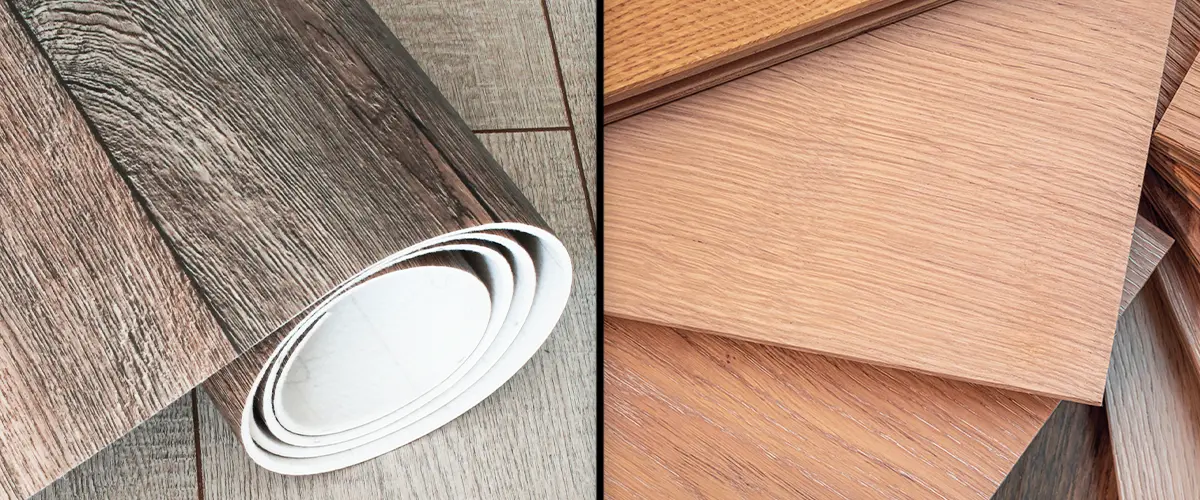
What is Vinyl Flooring?
Vinyl flooring is a synthetic material made primarily from PVC. It’s designed to mimic the look of natural materials like wood or stone, but at a fraction of the cost. Vinyl flooring comes in various forms, including sheets, tiles, and planks, with luxury vinyl planks being the most popular for homes.
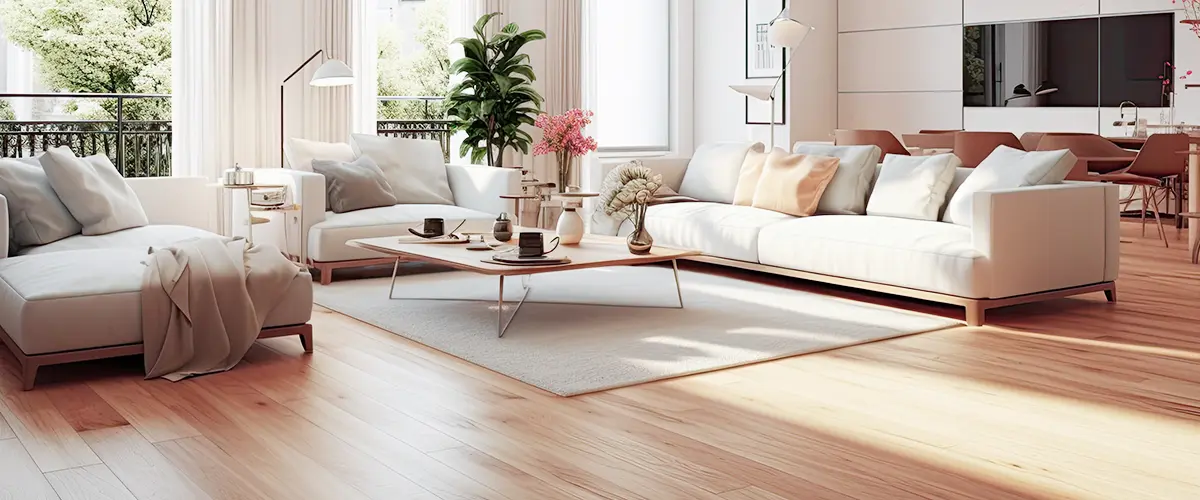
What is Engineered Hardwood?
Engineered hardwood is made from layers of wood. The top layer is a thin veneer of real hardwood, while the layers underneath are made from plywood or high-density fiberboard. This construction gives engineered hardwood the appearance of solid hardwood while being more stable and less prone to warping.
Vinyl vs. Engineered Hardwood - Durability
- Vinyl Flooring:
- Vinyl is highly durable and resistant to scratches, dents, and moisture. It’s an excellent option for areas with high traffic, like kitchens or hallways, and it can handle spills with ease.
- Engineered Hardwood
- Engineered hardwood is also durable but can be more susceptible to scratches and dents compared to vinyl. However, it’s more resistant to moisture than solid hardwood, making it suitable for areas like living rooms or bedrooms.
Appearance of Vinyl vs. Engineered Hardwood
- Vinyl Flooring:
- Advances in vinyl flooring have made it difficult to distinguish from real wood or stone. However, some people still feel it lacks the authentic look and feel of real wood.
- Engineered Hardwood
- Because the top layer is real wood, engineered hardwood provides a natural, authentic look that’s hard to match. It adds a touch of luxury and warmth to any room.
Vinyl vs. Engineered Hardwood Installation
- Vinyl Flooring:
- Vinyl is typically easier and quicker to install. Many vinyl planks come with a click-lock system that allows for a floating floor installation, which doesn’t require glue or nails.
- Engineered Hardwood
- Engineered hardwood can also be installed as a floating floor, but it’s often glued or stapled down for added stability. Installation might be a bit more time-consuming and could require professional help.
Vinyl vs. Engineered Hardwood Maintenance Requirements
- Vinyl Flooring:
- Vinyl is low-maintenance. It’s easy to clean with regular sweeping and mopping, and it doesn’t require any special treatments or sealants.
- Engineered Hardwood
- Engineered hardwood requires more care. You’ll need to avoid excessive moisture and use specific cleaning products designed for wood. It might also need refinishing after several years to restore its original look.
Costs of Vinyl Flooring and Engineered Hardwood
- Vinyl Flooring:
- Vinyl is generally less expensive than engineered hardwood. It’s a budget-friendly option that still provides a great look and decent durability.
- Engineered Hardwood
- While more expensive, engineered hardwood can add more value to your home. It’s a long-term investment that offers the beauty of real wood.
Comfort and Sound
- Vinyl Flooring:
- Vinyl is softer underfoot and has some give, making it comfortable to walk on. It also tends to be quieter, which is great for homes with kids or pets.
- Engineered Hardwood
- While it feels more solid underfoot, engineered hardwood can be a bit harder and louder. Adding an underlayment can help with comfort and noise reduction.
Moisture Resistance
- Vinyl Flooring:
- Vinyl is water-resistant, making it ideal for areas prone to moisture like bathrooms and basements.
- Engineered Hardwood
- Engineered hardwood is more resistant to moisture than solid wood but still not as moisture-resistant as vinyl. It’s best kept away from areas with high humidity or potential water exposure.
Lifespan of Vinyl Flooring and Engineered Hardwood
- Vinyl Flooring:
- Vinyl flooring can last anywhere from 10 to 20 years, depending on the quality and care.
- Engineered Hardwood
- Engineered hardwood can last 20 to 30 years or more, especially if it’s well-maintained and refinished when necessary.
| Feature | Vinyl Flooring | Engineered Hardwood |
|---|---|---|
| Durability | Highly resistant to scratches, dents, and moisture. | Durable, but more prone to scratches and dents compared to vinyl. |
| Appearance | Realistic wood or stone look, but lacks the authentic feel of wood. | Genuine wood veneer provides a natural, luxurious appearance. |
| Installation | Easy to install, often DIY-friendly with click-lock systems. | Can be DIY or professional installation; requires more time and effort. |
| Maintenance | Low maintenance; easy to clean and no special treatment needed. | Requires careful maintenance, specific cleaning products, and occasional refinishing. |
| Cost | More affordable, budget-friendly. | Higher cost but adds more value to your home. |
| Comfort and Sound | Softer underfoot and quieter. | Feels more solid but can be louder; underlayment can help. |
| Moisture Resistance | Water-resistant, ideal for bathrooms and kitchens. | More moisture-resistant than solid wood but not as much as vinyl. |
| Lifespan | Lasts 10-20 years depending on quality and care. | Can last 20-30 years or more with proper care. |
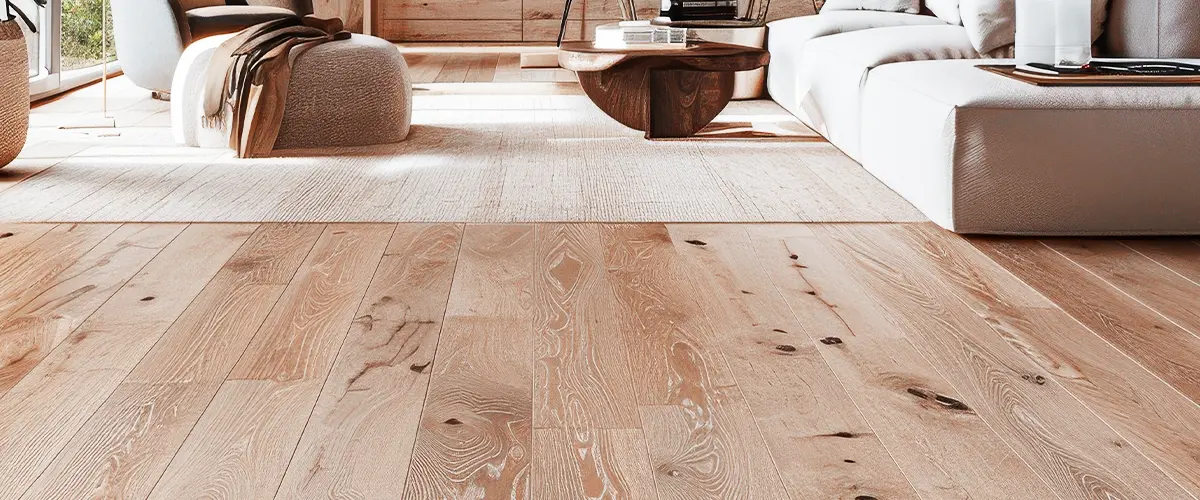
Room Suitability - Vinyl Flooring and Engineered Hardwood
Choosing between vinyl and engineered hardwood often depends on the specific room where the flooring will be installed. Here’s a breakdown of which flooring works best in different areas of your home:
High-Traffic Areas
- Vinyl Flooring: Vinyl is an excellent choice for high-traffic areas like entryways, hallways, and kitchens. It’s highly durable, resistant to scratches and dents, and can handle the wear and tear of daily life. Plus, its water-resistant properties make it perfect for spots where spills or moisture are common.
- Engineered Hardwood: While engineered hardwood is also durable, it’s better suited for moderately trafficked areas like living rooms or bedrooms. It can handle daily foot traffic but might show wear faster in very busy areas, especially if pets or kids are frequently running around.
Moisture-Prone Areas
- Vinyl Flooring: Vinyl shines in moisture-prone areas like bathrooms, laundry rooms, and basements. Its water-resistant nature ensures that it won’t warp, swell, or get damaged by water exposure. This makes it a safer, lower-maintenance option for spaces where humidity and moisture are concerns.
- Engineered Hardwood: Engineered hardwood is more moisture-resistant than solid hardwood but still isn’t the best option for areas with a lot of water exposure. It can work in kitchens or powder rooms where moisture is minimal, but it’s generally not recommended for full bathrooms or basements.
Living Spaces
- Vinyl Flooring: Vinyl can work well in living spaces, especially if you want something low-maintenance. However, if you’re looking for a more authentic wood look and feel, vinyl might not offer the same warmth and natural beauty as real wood.
- Engineered Hardwood: Engineered hardwood is a top choice for living rooms, dining rooms, and bedrooms. It provides a classic, timeless look that enhances the overall feel of these spaces. The natural wood surface gives a warm, inviting ambiance that’s perfect for areas where you relax and entertain.
Aesthetic Considerations
- Vinyl Flooring: Vinyl has come a long way in terms of design and can mimic the look of wood, stone, and other natural materials quite convincingly. It’s great for those on a budget or for rooms where practicality is more important than having real wood.
- Engineered Hardwood: If you’re after a luxurious, high-end appearance, engineered hardwood is the way to go. It offers the beauty and feel of natural wood, adding value and elegance to any room. It’s especially ideal for spaces where aesthetics are a priority, like the main living areas of your home.
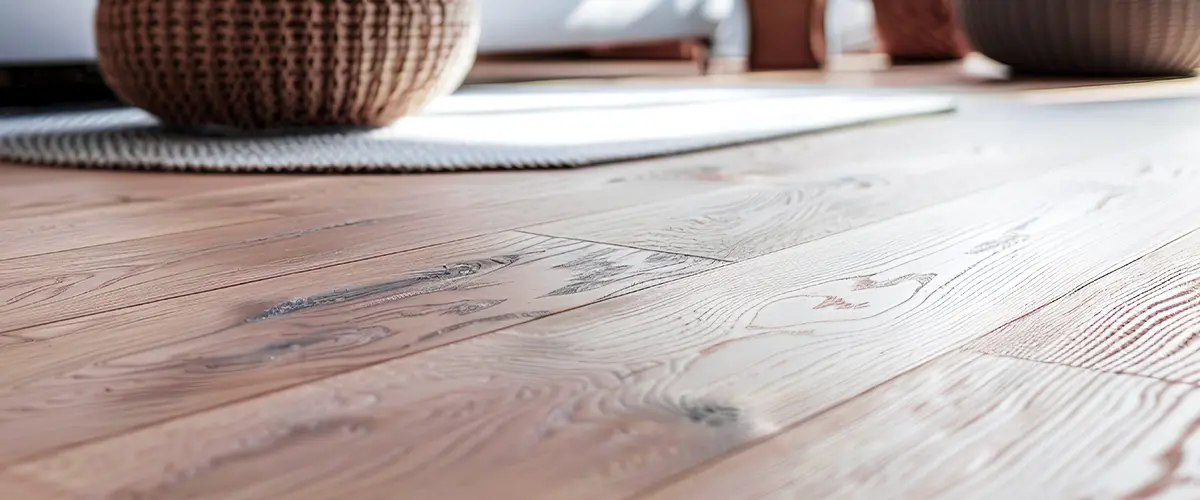
Further Reading: Best Shower Pan Base Materials
FAQ
Yes, vinyl is generally more durable, especially in high-traffic and moisture-prone areas.
It’s not recommended for full bathrooms due to moisture concerns, but it can be used in powder rooms with minimal moisture.
Engineered hardwood typically adds more value to your home due to its natural wood surface and upscale appearance.
Yes, vinyl is usually easier to install, often being a DIY-friendly option, while engineered hardwood might require professional installation.
Make The Right Choice For Your Home
Choosing the right flooring is a big decision that impacts both the look and functionality of your home. Whether you’re leaning towards the durability and low maintenance of vinyl or the natural beauty of engineered hardwood, understanding the strengths of each will help you make the best choice in your bathroom or kitchen remodeling journey.
Ready to transform your home with new flooring? At Baileys Remodeling, we’re here to help you every step of the way. Contact us today to get started on your flooring project and create a space you’ll love for years to come! (919) 986-6162
